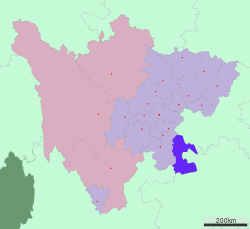Luzhou
|
Luzhou 泸州市 |
|
|---|---|
| Prefecture-level city | |
 Location of Luzhou City jurisdiction in Sichuan |
|
| Location in China | |
| Coordinates: 28°53′N 105°27′E / 28.883°N 105.450°ECoordinates: 28°53′N 105°27′E / 28.883°N 105.450°E | |
| Country | China |
| Province | Sichuan |
| County-level divisions | 7 |
| Established | 151 BC |
| Government | |
| • Type | Prefecture-level city |
| • CPC Luzhou Secretary | Jiang Fuyi (蒋辅义) |
| • Mayor | Liu Qiang (刘强) |
| Area | |
| • Prefecture-level city | 12,233.58 km2 (4,723.41 sq mi) |
| • Metro | 981.7 km2 (379.0 sq mi) |
| Elevation | 262 m (860 ft) |
| Population (2010 census) | |
| • Prefecture-level city | 4,218,427 |
| • Density | 340/km2 (890/sq mi) |
| • Metro | 919,832 |
| Demonym(s) | Luzhouese |
| Major ethnic groups | |
| • Han | 98.47% |
| • Miao | 1.26% |
| • other ethnic groups | 0.27% |
| Time zone | China Standard (UTC+8) |
| Postal code | 646000 |
| Area code(s) | 830 |
| GDP | 2011 |
| - Total | CNY 90.09 billion (USD 14.33 billion) |
| - Per capita | CNY 21,358 (USD 3,395) |
| - Growth |
|
| City flower | Osmanthus fragrans |
| City tree | Longan tree |
| Regional dialect | Chuan: Luzhou dialect (泸州话) |
| License plate prefix | 川E |
| Website | luzhou |
Luzhou (simplified Chinese: ; traditional Chinese: 瀘州; pinyin: Lúzhōu; Sichuanese Pinyin: Nu2zou1; Luzhou dialect: [nu˨˩tsəu˥]), formerly transliterated as Lu-chou or Luchow, is a prefecture-level city located in the southeast of Sichuan Province, China. The city, named Jiangyang until the Southern and Northern Dynasties, is known as the "wine city". Situated at the confluence of the Tuo River and the Yangtze River, Luzhou is not only an important port on the Yangtze river, but also the largest port in both size and output in Sichuan province since Chongqing seceded from Sichuan province in 1997. At the 2010 census its population was 4,218,427 inhabitants whom 919,832 lived in the built-up (or metro) area made of Jiangyang and Longmatan districts, as Naxi district isn't conurbated yet. Luzhou, which borders Yunnan, Guizhou and Chongqing, is the only geographic junction of the four provinces, and was therefore the logical place for a port in ancient China. After the PRC was founded in 1949, Luzhou became the capital of southern Sichuan province. In 1983, Luzhou was approved as a prefecture-level city administratively.
Luzhou is best known for its alcoholic beverages.
Luzhou was incorporated into the Ba state early in the Shang and Zhou period, in the 11th century BC. In 316 BC, during the Warring States period, King Huiwen of Qin established Ba prefecture, which included most of Luzhou, after he conquered the states of Ba and Shu. The local economy and culture expanded as a result of the advanced production technique and culture introduced by immigrants from the rest of China. During the Western Han Dynasty (206 BC-AD 23), Jiangyang county was set up in what is the current Jiangyang district, at the confluence of the Tuo River and Yangtze River. The county was further expanded during the reign of Emperor Wu of Han. As a result, Luzhou became the portal of the Tuojing River leading to western Sichuan, which brought great prosperity to salt-refinery and agriculture in the area.
...
Wikipedia

